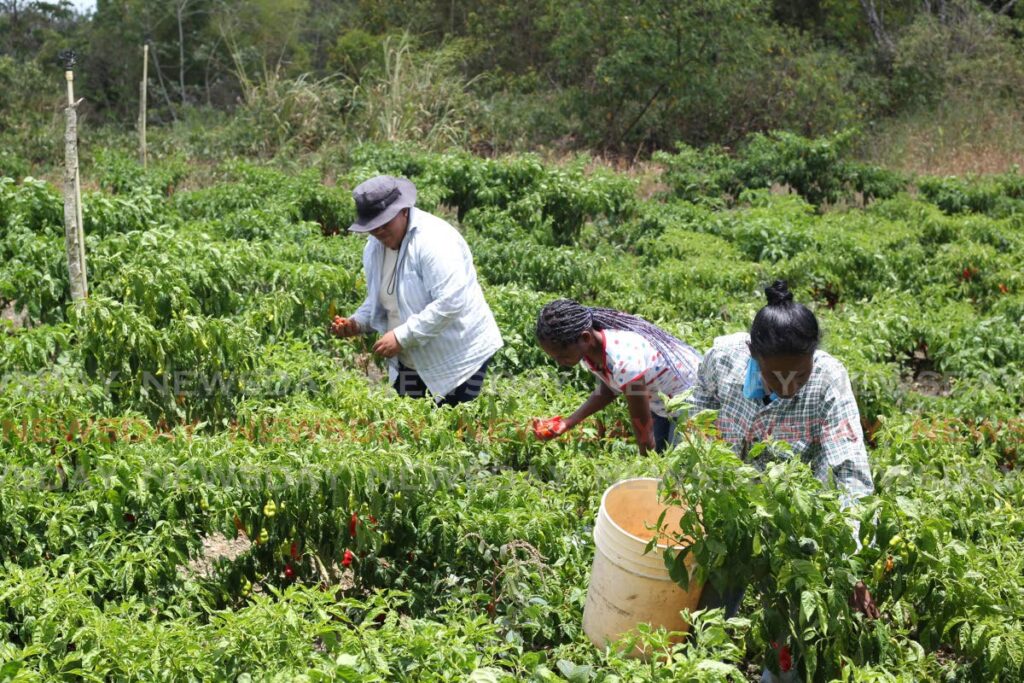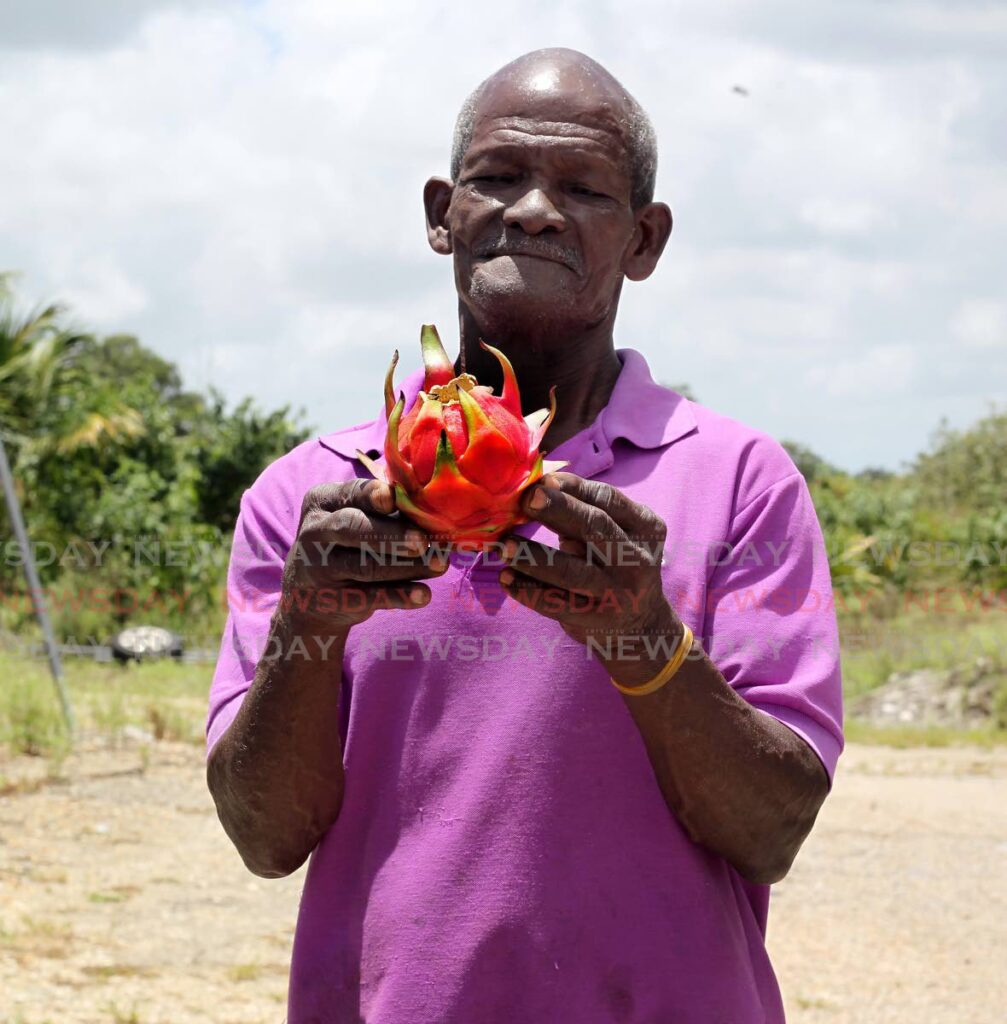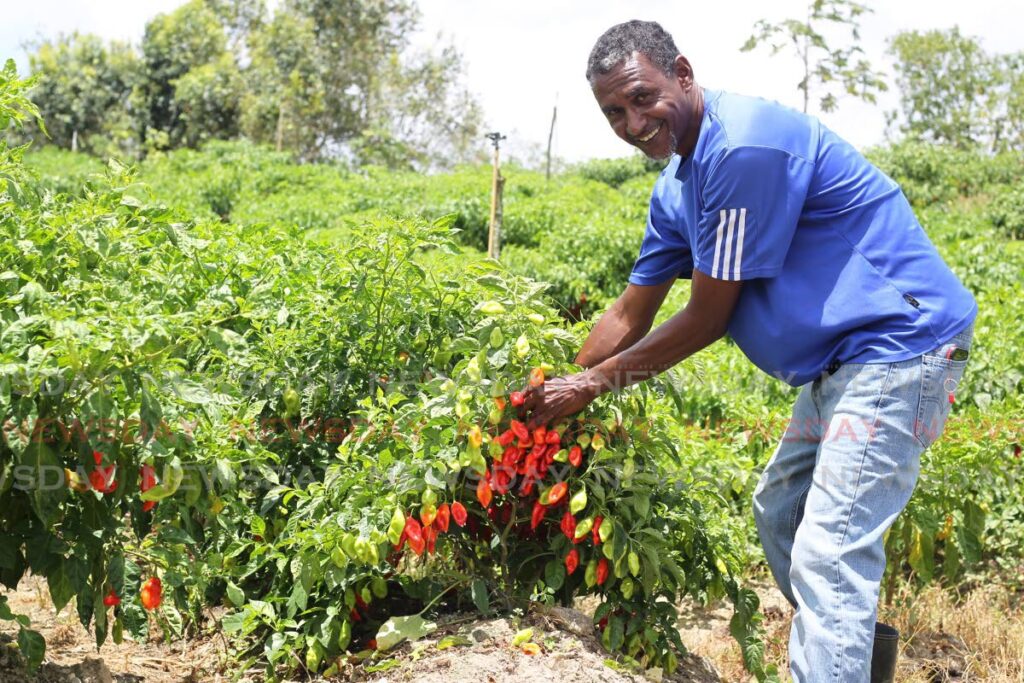Fed-up farmers of Wallerfield, Turure appeal for 'leases to survive'

For over 60 years, Paul De Four, one of the original dairy farmers in Wallerfield has invested more than his blood, sweat and tears to toil the arable 20-acre plot at Block 3, producing truckloads of fruit, urns of milk, prime beef and a fountain of knowledge that he willingly shares to anyone who has a passion for agriculture.
De Four, who celebrates his 81st birthday on May 22, like some of the surviving first-generation and second-generation farmers of dairy farmers Wallerfield, Carlsen Field, in Central Trinidad and Turure, near the eastern town of Sangre Grande all share one bitter experience – the inordinate, costly and bureaucratic process to get their original leases renewed by the Ministry of Agriculture.
On Saturday, La Horquetta/Talparo MP Foster Cummings, Arima MP Pennelope Beckles spoke at an event hosted by the Heliconia Foundation at Solomon Temple, in Wallerfield addressing the issue of land tenure of the Wallerfield farmers. The farmers hope this is not yet another talk shop.
Without leases, they cannot use the land as collateral to get loans to invest and access the myriad subsidies offered by the State to bonafide, registered farmers.
Several of the 60-plus farmers who turned up on Saturday shared similar stories.

Pig farmer Willhimea Benn, 91, better known as "Ma Benn," who Cummings said was the person who inspired the meeting, said she has been waiting for 50 years to get her lease approved for her three-acre parcel and had fallen victim to thieves and bandits who often made off with her prized pigs and ducks. She said she spends her entire pension of $3,000 to buy feed for her animals but sales were slow coming out of the pandemic.
Trevor Richardson, 72, a surviving member of the Memphis Co-operative which had been allocated 85 acres said they have been waiting for three decades to get approval to renew the lease.
Another farmer John Lopez, 85, who uses a cane to help him walk, said he had applied 15 years ago for approval for the 11 acres he has occupied, and over that time the response has been it was waiting Cabinet approval.
"That Cabinet must be fall down," he said. Lopez said he has attended countless meetings over the years, hoping to get the issues resolved, and, "this might be my last meeting."
He said officials of the Agricultural Development Bank asked him on Saturday if he was interested in a loan and he replied, "I want a loan to buy my coffin."
In response to queries, Susan Shurland permanent secretary of the Ministry of Agriculture, Land and Fisheries said the ministry could not immediately give a number of leases approved between 2015-2022 by Cabinet as the Office of the Chief State Solicitor is charged with the execution of those leases.
"An update on the specific quantum of leases executed shall be forthcoming," the statement said.

Data from the ministry revealed that out of the 137 dairy farms in the Wallerfield district only 26 had active farmers, leaving some of 111 remaining 20-acre plots cultivated with both short and long-term crops. The development comprises of 4,328 hectares distributed in 1,149 20-acre parcels of land.
Asked how many farmers have been served with notices to quit or served eviction notices based on their inability to rear cows, the ministry said it was not its policy "to serve farmers with quit and eviction notices based on their inability to rear livestock on state lands allocated. We serve advisory notices for farmers to improve their farming practices. In most cases the leases have expired and the heirs and successors are on the parcels. We then make efforts to have their occupancy regularised."
The ministry said it was aware of farmers whose operations are threatened by illegal quarrying and noted a unit of the police service continues to monitor and investigate intelligence in relation to such activity.
Former agriculture minister Clarence Rambharat said during his seven-year tenure he was able to get Cabinet's approval to renew about 60 per cent of the expired leases for the Carlsen Field dairy farmers.
He said the ministry's policy was not to process applications where farmers had breached the existing policy to construct more than one home on the property. In Wallerfield, he said the situation was different as some tenants were renting the land to other farmers, had family conflicts and there was uncertainty about how the highway expansion projects will affect their farms.
Rambharat said he was able to revive the dairy industry to about 100 farmers, 80 of whom remain "very active" as well as help negotiate an increased price from Nestle, the main market for farmers.
Farmers said they earn an estimated $5 a kilogramme for top quality milk, as $3.50 is paid by Nestle and the state subsidises the payment with an additional $1.50 per kilogramme.
Farmers in Turure also complained about the constant rumbling of a fleet of trucks carting away tonnes of aggregate leaving behind craters in the unpaved roadway and plumes of dust in their wake.
"How can cows produce milk in those conditions?" one farmer asked. A representative group spoke to Sunday Newsday at the Turure Milk Depot last Thursday where they pleaded for help to combat cattle rustlers, squatters and the construction of buildings bordering their farms that made it an uninhabitable environment for cows. All these factors, including the high cost of dairy ration (grains to feed cows), the unavailability of quality forage, and increased carbon emissions, lead to low productivity in animals.
The Turure farmers were reluctant to be named saying they feared victimisation from the authorities but they agreed that their main issues had been neglected by politicians over the years leading them to the brink of defeat.

One farmer referred to the recent visit by the Prime Minister to the Aripo Livestock Farm which recently imported 100 top quality milk producing cows, saying he could not even dream of importing animals because of the high cost and bureaucratic process to get the necessary import permits.
Farmers said the chronic shortage of staff at the Office of the Commissioner of State Lands, the almost $20,000 cost to survey the 20-acre plots, the insistence on dairy farming as opposed to vegetable farming, and lack of interest by their offspring to get into farming were some of the obstacles they face. They said some of them have been waiting for more than five to ten years for an acknowledgement of their application to renew the lease. They admitted that some farmers had given up.
Asked if they were confident that the lease issues would be resolved in their lifetime, one farmer responded jokingly, "You turning this into a Learie Joseph situation, or what?"
The farmers said an expanding community of squatters was encroaching on their farms, spraying weedicide on pastures, stealing fences and building homes on the land with impunity as the police, Land Settlement Agency and local politicians seemed impotent to act.
"Farmers are the bastard children of the government," another farmer quipped but hoped the Prime Minister's love for farming will influence the policy decisions of the government.
Farmers like De Four who started off in dairy have not diversified their farms to produce a mix of crops. De Four, who graduated from the Presto Preasto youth camp in Freeport after studying agriculture at the age of 21, was selected to acquire one of the Wallerfield farms in the 1960s under an agriculture programme of the Dr Eric Williams' administration.
De Four said he was once regarded as one of the best dairy farmers in the country, and copped the top awards including farmer of the year by the Ministry of Agriculture. He said after encountering problems with loans from the Agricultural Development Bank, he tried on his own to develop the farm.
He later planted over 7,000 dwarf pommecythere trees, 4,000 dwarf coconuts, and 800 citrus trees. He was one of the first farmers to experiment with dragon fruit plants in the northeast part of the country.
"My whole farm is diversified," he said as he proudly showed his crops during a tour on Thursday.
De Four said like other farmers in Wallerfield, he too has fallen prey to thieves who make off with his animals and crops without facing any consequences.
He said while politicians have made several promises to him over the years, the only real benefit was to access a $100,000 grant to improve his farm. He was not optimistic that politicians would keep to their promises to help resolve the real issues facing farmers such as proper access roads, the establishment of a dedicated praedial larceny squad, and a less burdensome process to get leases renewed.

De Four said to this day it pains him whenever he looks at the weathered signs in his yard where a once-thriving resort for primary and Montessori school children existed.
He said he had to close the operation on the advice of an agricultural officer to apply for a renewal of his lease as it was not under the ambit of farming. De Four said he also had to invest $300,000 to reintroduce cows on his farm three years ago when he reapplied for a renewal of his lease.
A decision which the former agriculture minister disapproved of as De Four was using the land for farming other crops already.
Asked what advice he would give to a young person interested in farming, De Four said: "I still encourage young people, to me it is the best job a young man could go into. You have no boss over you. In a private job, you have to hustle to reach on time otherwise they cut your time or they are ready to fire you. Nobody to fire me. All that I know I have to work and provide for my four children, one boy and three girls. We actually have about four generations on the farm since I came here and they are properly educated. I educated them through the farm. I will still tell a young man this is the way to go. All you have to be consistent, follow the rules, follow the regulations, despite the praedial larceny, access road in a dilapidated state."
Another successful Wallerfield farmer Bilaal Ali, 50, whose application for a parcel of land at Mexico Road is being processed said it should not have taken him over 20 years to get recognition.
Ali, who is cultivating over 24 acres of pimentos and hot peppers in two other locations, said while his trees were laden with bright red peppers, it was costing him more to hire people to pick the peppers than the $150 for a crocus bag he was getting wholesale at the market. He is desperately seeking an export market for his peppers and more land to plant.
Other farms in the Wallerfield area appeared to be abandoned during a tour on Thursday and others were excavated by miners harvesting valuable aggregate in breach of the lease agreements.

Comments
"Fed-up farmers of Wallerfield, Turure appeal for ‘leases to survive’"